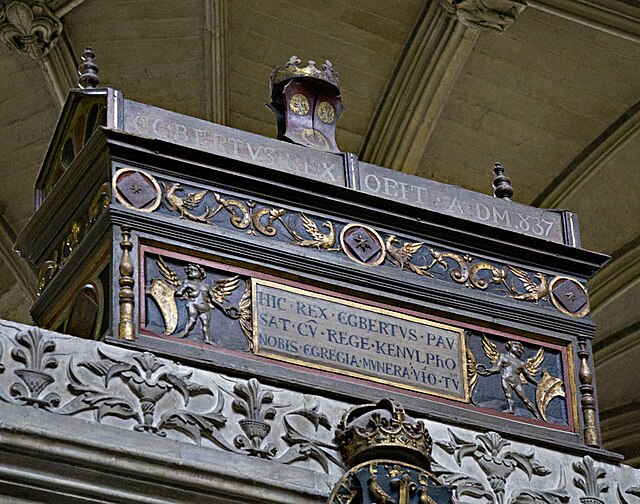Ecgberht, also spelled Egbert, Ecgbert, Ecgbriht, Ecgbeorht, and Ecbert, was King of Wessex from 802 until his death in 839. His father was King Ealhmund of Kent. In the 780s, Ecgberht was forced into exile to Charlemagne's court in the Frankish Empire by the kings Offa of Mercia and Beorhtric of Wessex, but on Beorhtric's death in 802, Ecgberht returned and took the throne.
Depiction of Ecgberht from the Genealogical Chronicle of the English Kings, a late 13th-century manuscript in the British Library
Coin of King Ecgberht
Charter S 1438, in which King Ecgberht and the Archbishop of Canterbury promised mutual support of the church and the West Saxon crown at the Council of Kingston in 838
16th-century mortuary chest, one in a series set up by Bishop Foxe in Winchester Cathedral, which purports to contain Ecgberht's bones
Charlemagne was King of the Franks from 768, King of the Lombards from 774, and Emperor of what is now known as the Carolingian Empire from 800, holding all these titles until his death in 814. Charlemagne succeeded in uniting the majority of Western Central Europe, and was the first recognized emperor to rule in the west after the fall of the Western Roman Empire approximately three centuries earlier. Charlemagne's rule saw a program of political and social changes that had a lasting impact on Europe in the Middle Ages.
A denarius of Charlemagne dated c. 812–814 with the inscription KAROLVS IMP AVG (Karolus Imperator Augustus)
Sketch thought to be of Charlemagne c. 800
20th-century painting of Charlemagne's coronation at Noyon in 768.
Pope Adrian receiving Charlemagne at Rome








